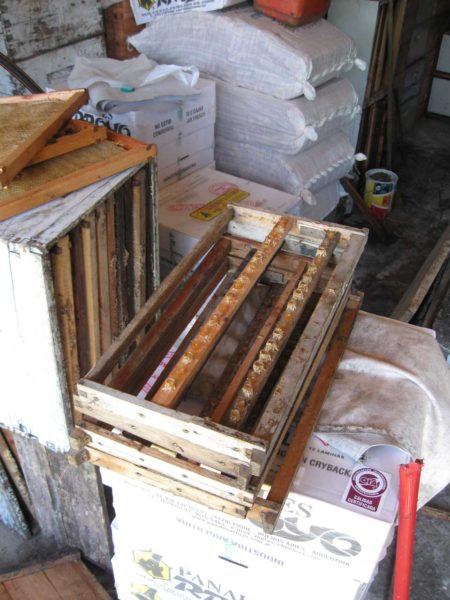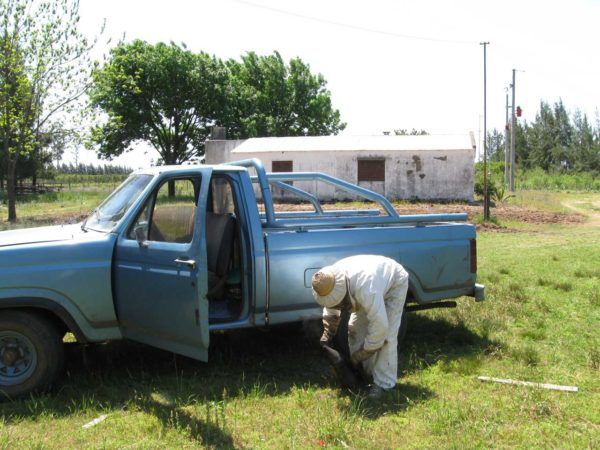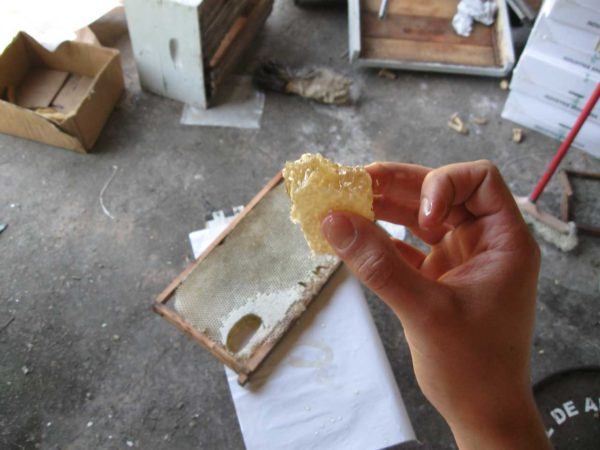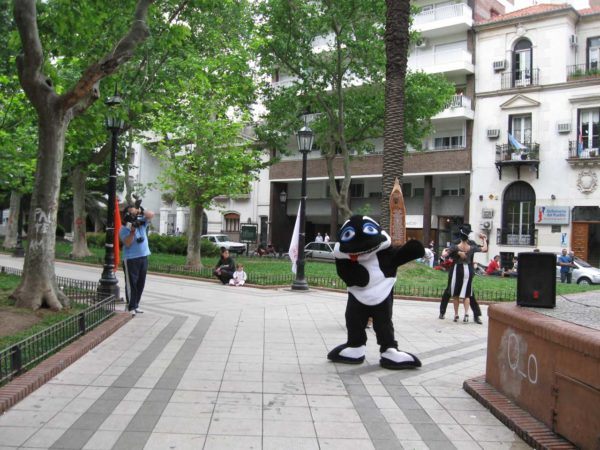Russell Slater is a freelance journalist currently hopping on a bus, eating a baguette and listening to his walkman. It’s no surprise then that he likes writing about travel, food and music. He is a regular contributor to Uruguay Now, Brazzil, Matador Travel and A Different League, writes occasionally for a number of other websites. Please enjoy a week-in-the-life of Russell from On The Road to Find Out, as he sniffs out honey in Argentina.
This post was originally published in 2010. It has since been updated for accuracy of links and content.
Ever since I first tasted the honey in Argentina, I have been unable to forget it. Honey has always been one of my favourite food stuffs, not least because it has helped me through some horrendous pollen blizzards during many an English summer. It truly is the food of goods, able to make anything taste great (I dare you to try pasta with just honey and cinnamon).
This fascination with Argentinean honey has led me to Concordia, in the Entre Rios province of Argentina. I have come to find out how they make such good honey. I also want to improve my Spanish and get to know some of the locals, but the honey is my main priority. Through some contacts I made when I was last here I have managed to get a phone number for a beekeeper who has agreed to let me shadow him for a couple of weeks and learn the ropes.
Day 1
It seems I have not planned this well, for it is the first day of my diary and I am on a bus. Nothing ever seems to work out the way it was planned. This is especially true when you forgot to plan anything in the first place. The good news though is that I am on an Argentine bus and not a Brazilian one. Without experiencing either of these buses it may seem like there would be very little difference between them. How wrong you could be! To ride a Brazilian bus is to fit your entire body into a space that only a stray dog could find comfortable, to constantly look up at the bus conductor as he walks by and wonder if he’s going to give you that packet of biscuits you’ve been waiting so long for, to maybe offer you a pillow or a sheet, or just to tell you that the toilet is now functioning. None of these things will happen.
So as I plump up my pillow, pull my blanket up to my waist and prepare to tuck into the rice, milanesa, bread and milk-based dessert that has just been served to me, I am considerably happier on a bus than I have been for a while.
Day 2
When I wake up it is light. We stop on a main road and almost everyone gets off. I tentatively ask the conductor if this is ‘Concordia.’ I cross my fingers for a ‘no’ but he goes for the opposite.

I get my bags and stand by the side of the road as the bus drives off. There’s a couple of roads that lead off from the one I’m on, but seem to head into the great nothing. I see a taxi driver in the distance so make my way towards him. I ask him where Concordia is. He tells me it’s “far… very far.” When I ask if there’s a bus going that way he tells me only one bus runs each day, and it passed by about two hours ago. Never one to pay for a taxi unless it is 100% necessary I obligingly throw my stuff in the boot and head off to Concordia.
It seems I arrived on the worst possible day. It is Monday, Tuesday is a National holiday, yesterday was Sunday. I am in some kind of holiday vacuum. Technically it’s a work day, but the chance of people coming to work between two days off is about as likely as finding a Brazilian Stoke City Football Club Supporters Club.
This prolonged holiday also carries with it the added bonus that almost everywhere in the city is full. Finding somewhere to stay is already looking slightly iffy. There are no hostels in Concordia and the cheapest hotels are around 70 pesos. After just paying 25 pesos for a hostel in Puerto Iguazu I wasn’t looking forward to the price hike. I had also looked into the possibility of couchsurfing during my time here but could only find three people on the site, of which only one replied. She then proceeded to send me on a wild merry-go-round of directions to make phone calls to various places in the city, which she would no longer be at because she sent the message about five hours ago and due to the lack of Internet cafes during the holidays I was a little late in replying. As she failed to answer the very basic question, “is there any possibility of staying with you?” I decided to give up the trail.
I eventually find a posada (guesthouse) that seems okay. It is a lot more than I want to pay, but I am tired and they have Internet and a bath, and the girl on reception is ultimately enough reason alone to stay, so I do.
I ring the beekeeper every couple of hours but there is no reply. I guess his phone is on holiday too.
Day 3

In my head the idea of a week spent reaching Concordia and learning to beekeep would be full of excitement. I have been known to have a loose grasp of excitement previously (the lights in my eyes when presented with a crossword or a chocolate digestive being cases in point) but constantly facing the answering machines of absent Argentinians hour after hour is not it.
I manage to speak to Alcides and somehow understand that his high-pitched country voice is trying to tell me something, directions not surprisingly, and so I scribble something down that seems like a plan, and cross my fingers for tomorrow.
Day 4
After rigorously exploring the bright lights of Concordia I am finally able to go and meet Alcides. I follow his instruction carefully. I am to take the 12pm bus to La Criolla, get off at the terminal and give him a call. When I arrive in La Criolla the terminal has a strange look about it. I walk around. It is quite clearly closed, wrapped so tightly in protective plastic it resembles a packed lunch. Chances of getting inside are slim to none. I wonder how I am going to make that call. I look around but there is little sign of life.
After a while a couple of school kids come walking down the street. Maybe it is the first time they have ever heard the word ‘telephone’ because they look at me as if I am carrying the ‘New World’ upon my shoulders. ‘Maybe there is a telephone on another street’ seems to be the best I can get out of them and I continue walking. My clothes begin to make more and more noise as I become more aware of the burgeoning quiet around me. While contemplating taking a U-Turn into another avenue of vague nothingness, I notice a sign in the distance, something a little bit official. As each step makes the words more visible I realise it is for the Police department and pick myself up into something of a gallop.
The officer’s quick-witted quirps are so sharp they leave me in a complete mire of misunderstanding, wishing I’d chosen to ask the dirt on the ground instead. Once he realises his job is to help people, he asks me exactly what it is I want. I tell him I am after a phone. They want to know who I am going to call so I tell him Alcides. He takes me inside where two men are watching television. After many puzzled looks one of them, a tall man resembling one of those deep military rucksacks stufed with clothes, trundles off down the road to another house to call Alcides for me. “He’ll be here in a minute” he tells me when he gets back.

It is a relief when Alcides arrives and even more of a relief when he asks if I want to go straight out into the field. I am ready to do something after dawdling about for a couple of days.
A short half-an-hour and various swigs of matte later I find myself in beekeeper’s robes in the middle of the Argentinian countrside.
Today’s task is to kill all of the queen bees. This involves finding them first. Each hive contains one queen bee and up to two or three million normal bees. Plus, the only difference between the queen and the rest is that she is slightly longer, more cone-shaped and is a bit more red in colour. Surprisingly I soon get the hang of it and am picking out the queen from each hive in seconds flat.
We finish up about 5pm and go back to Alcides’ place. There I meet one of the great flaws of my plan. The next bus to Concordia, where I am staying, is in three hours at 8pm. This wouldn’t have been a problem except it seemed that Alcides does not really have any place to relax. So we spend half an hour standing by the orange tree, another half an hour by the roses, a full 45 minutes watching cattle auctions on TV (and they say Argentinians are obsessed with meat!) and another half an hour by the car. This leaves me with just 45 minutes left, which with a rather radical change in pace, we decide to stand by the backdoor. Maybe this shouldn’t be a problem, Alcides is a really nice guy, but there are only so many questions I can think of regarding bees, Argentina, the countryside, football and anything else he might be interested in, and almost all of these questions are met with one-word answers and very little else.
Day 5

Today’s task is to create new queen bees, which involves taking a very dodgy-looking egg-like substance, mixing it with a little honey and a tiny bee embryo and placing it in a wax panel, which is then inserted into the hive. In about 4 or 5 days new queens will be born, and since new queens mean more honey this is a very good thing indeed. After spending roughly two hours setting-up these new queen-bees-to-be, Alcides retrieves a panel of fresh honey from one of the hives and then cuts a huge chunk out of it. I shove the whole thing in my gob in one foul swoop. It really is the sweetest thing I have ever tasted in my life. Sweet but not sickly. I take another chunk and savour the taste of the honey before spitting out the wax that remains. We take the rest of the panel to Alcides’ house where he squeezes it into a jar for me to take home.
I also get my first bee sting. A small amount of honey had deposited itself in my beard after my tasting session. This must smell great for the bees flying around as they all flock to my face to have a sniff. Eventually one gets caught in the carpet of my chin and retaliates with a quick sting. After 5 minutes of numbness I feel normal again, and really begin to wonder what all the fuss is about. It is by far the least painful bite or sting I have ever received. Still, it doesn’t stop me from running into the van every time another bee starts flying around my face (Alcides tells me this is definitely the best method of escape, and he is right, they really don’t like the inside of vans for some reason!)
I don’t get back to Concordia until 9pm. I am staying at the Bowles club, at 50 pesos by far the cheapest place I can find (despite still being above my budget) but after arriving for the second night it has already begun to depress me. With nowhere to relax other than a small, un-cleaned room with stained white plasterboard walls, iron bars for windows and lukewarm shower, it is quite far from being a nice place to bed down after a hard day of working with bees in the Argentine sun.
So, I decide to go around every hotel in town and try and broker a deal for 50-60 pesos per night, but for a place with a bit of character. Eventually near the main square I manage to find somewhere with a couple of living rooms, Internet, cosy room, TV and pretty cheery staff and settle on 60 pesos for the night, a good dip from 70 which is the norm.
I head back to the Bowles club, sleeping all the better for knowing that I will have a shiny new bed and place to stay the following day.
Day 6
I wake and head straight for the new hotel. It’s a fair walk – about one hour – which with a huge backpack and guitar, and in the Argentine sun, can be somewhat draining. When I arrive I am told the person who is staying in the room has decided to stay for the weekend. But hold on, I made a reservation last night and have the receipt to prove it. Sorry they tell me, they didn’t realise the person wanted to stay longer. And the reservation? Does it count for anything? Unfortunately not.
I grab my bag, cancelling the whole week’s reservation and head back out. There really were no other options that came even close to this one, and so I decide to cut my losses. After a while, after paying far too much for average accommodation and facing that reality for the future too, it seems like the best thing is just to get on with life, and not worry about missed opportunities. It has been amazing to meet Alcides and to get something of an introduction to bee-keeping, but it’s impossible to be relaxed without a nice place to stay, and when all of these are hugely out-of-budget it makes things very difficult indeed.
I ring Alcides to tell him the news. He understands. Somethings are just not meant to be. I head to the bus station and head off to Rosario. This is a place I know has hostels.
Day 7
Rosario is a step back into the traveller’s life that I am now so accustomed, a land of endless Bob Marley, of exchanging lists of destinations with everyone I meet, of wishing people would ask more interesting questions (‘what’s your favourite ice cream?’ would be a start), of walls that seem to talk in a language of bangs and coughs, and of having to chop onions with a tiny serrated knife.

I decide to step outside. Rosario is a city like no other, yet one that seems to get universal praise. It’s a few blocks before I find a park and somewhere to sit. Two couples are dancing to the tango at one end of the park, looks like its being filmed. A couple of young guys in black shirts and arms covered in cuts stand watching, arms draped over each other. I watch in anticipation of mischief but none comes along. Eventually they come and sit next to me, where they proceed to shout strange fragments of words at irregular intervals and to the general ignorance of anyone around them. I change benches, heading to the other end of the park. This seems to be a better choice. I am transfixed by all the girls walking past, trying to imagine their origins, their stories. Italian, goth, German, Spanish, Russian, student. If there was a more poetic way of writing about gawking at girls as they walk past, believe me, I would write it here.
It’s nice to be back in a place which is able to accommodate a traveller with a huge dent in his pocket and not much jangling when he walks the streets, but also a massive shame to be far from the countryside and the bees. I really want to see those queen bees hatch but things can’t always work out the way they are planned. I suddenly have an idea to head to Patagonia. It is October and hence not a bad time to go to one of the coldest and windiest places this side of the Antarctic. Suddenly I am consulting bus times, pulling out my tattered copy of Bruce Chatwin’s ‘In Patagonia’ and realising that once one door shuts, another one will soon be open, or you could just climb out of the window.
Oh, and neopolitan is always the answer. I like to have options!
Russell is currently in Montevideo, designing a website and writing a variety of articles for an English-language travel guide to Uruguay, which are available at Uruguay Now. After that, he will be returning to Brazil, and will head up the North coast beginning in Rio, in search of music, football, and a fine array of fruits! You can read about his latest adventures at On The Road to Find Out.



Greetings from Finland. This is a nice blog. I’m wondering if you have any advice about staying out of the friend zone with women? I’m really tired of girls telling me they just want to be friends. Maybe I’m being too nice?